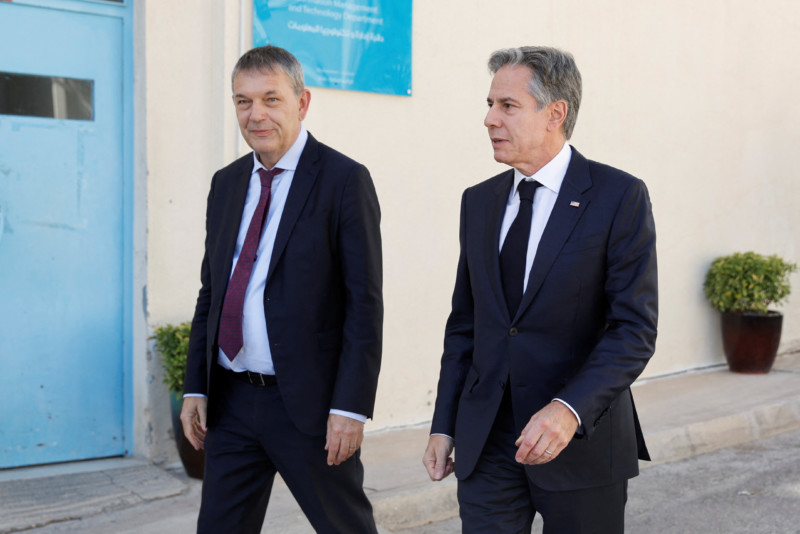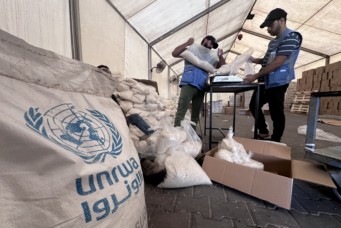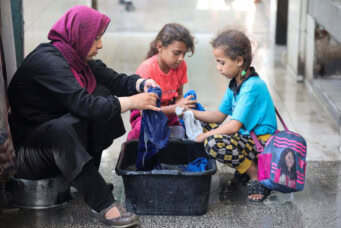UNRWA Funding is Burdened with Conditionality
The UN agency’s essential humanitarian role lies in the balance thanks to the political contingencies of its donors.

U.S. Secretary of State Antony Blinken walks with UN Relief and Works Agency for Palestine Refugees in the Near East (UNRWA) Commissioner-General Philippe Lazzarini, during a day of meetings about the ongoing conflict between Israel and the Palestinian Islamist group Hamas, in Amman, Jordan, November 4, 2023. REUTERS/Jonathan Ernst/Pool
Since its establishment in 1949, UNRWA—the UN agency for Palestine refugees—has provided aid, shelter, healthcare, and education to refugees across the Middle East. Today it serves almost six million Palestinans, including 1.5 million in Gaza. With Israel’s current onslaught continuing to devastate the Strip, UNRWA is now providing life-saving services to three-quarters of the population there. Its aid includes food assistance for more than a million Palestinians in Gaza, as Israel’s bombardment and blockade causes famine to spread across the territory.
Yet UNRWA’s essential humanitarian role in Gaza is currently under threat from a funding bill passed by the U.S. Congress in March. The bill extended the ban on the provision of any funding to the agency until March 2025. Supporters of the funding ban, such as House Speaker Mike Johnson, have pointed to Israeli allegations, unproven and reportedly based on false confessions coerced by torture, that twelve of UNRWA’s 13,000 Gaza staff participated in the October 7 attacks. Johnson says it is necessary to “halt funding for the UN agency which employed terrorists”, and members of Congress from both parties concur.
However, the move stands in stark contrast to the United States’ response to other incidents involving the UN. It continued to fund UN peacekeeping operations following repeated scandals of sexual exploitation and abuse and even complicity in war crimes. Its stance also diverges from European governments, many of which have resumed their funding to UNRWA after Israel failed to provide evidence for its allegations. The language used in the U.S bill is best understood, then, not as a response to the Israeli claims about staff involvement in October 7, but as part of an ongoing political campaign against UNRWA and Palestinian refugee rights writ large.
In fact, decision-making about funding UNRWA has always been politicized. Since the agency’s inception, governments have opted to finance its work—or not—on the basis of their own political calculations. Recognizing and responding to this, UNRWA management have in turn sought to position the agency’s work in line with donor preferences. As a result, UNRWA’s funding has always been burdened by the conditionality of donor demands, with its ability to operate hinging on the requirements of its funders.
UNRWA and the Politics of Aid
Political leaders in both Israel and the United States have for many years called for UNRWA to be dismantled. Benjamin Netanyahu first did so in 2017, claiming that the agency is biased against Israel and lacks the neutrality required of an aid body. In withdrawing financial support for UNRWA, U.S. President Joe Biden—who quickly signed the congressional bill into law—is acting in step with his administration’s allegiance to Israel, which has only intensified over the last six months.
Congresswoman Alexandra Ocasio-Cortez, who voted against the budget bill, was right when she described the defunding as “highly political”. Yet, what should not be missed in this conversation is the fact that U.S. financing of UNRWA’s work has always been political—even when funding was forthcoming. From the outset, donors have used UNRWA as a tool to manage, contain, and at times punish Palestinian refugees, precisely to achieve political objectives—whether the objective is to promote the refugees’ reintegration in Arab host countries, or to undermine political rights. Both the provision and the withdrawal of support for the agency has always been embedded in the governments’ political calculations of UN member states.
Of course, the politics of aid is a well-documented reality that is not limited to the case of UNRWA and the ongoing Palestinian refugee crisis. While aid is posited as a politically neutral act, its financing, logistics and delivery are always entangled with political dynamics and machinations. But for UNRWA, with its particularly central role in Gaza, the consequences can be especially fatal.
Paradoxically, the case of UNRWA also demonstrates what scholar Linda Tabar calls the anti-politics of humanitarianism, whereby aid recipients are depoliticized and constructed in terms devoid of any context. In the Palestinian case, this means treating the refugees as people in need of services, without taking account of the fundamentally political nature of their dispossession and displacement. The juxtaposition of these two strands in UNRWA’s work—politics and anti-politics—can explain many of the tensions around the agency’s work and purpose today.
The Politics of UNRWA’s Set-Up
Acting on the recommendations of a U.S.-supported Economic Survey Mission (ESM) in the region, the General Assembly established UNRWA in 1949 as a special agency to carry out “direct relief and works programs” for registered refugees from Palestine. Since beginning operations in May 1950, the UN Relief and Works Agency for Palestine Refugees in the Near East has become one of the largest service providers and employers in the Levant.
Despite creating UNRWA and regularly renewing its mandate every three to five years, the UN has never set up a reliable income stream to finance its work. Instead, UNRWA has relied on donations, mostly from UN member states in addition to a small portion from organizations and individuals. This set-up gives donors a high degree of leverage over the agency, as they can attach conditions to their funding and withdraw it according to their own whims. Over the last seven decades, UNRWA’s General Fund was overwhelmingly financed by Western donor states, particularly the United States and United Kingdom. It did not go unnoticed that these same states were close to Israel, and their support for UNRWA was one of several factors informing Palestinian suspicion of the agency’s political positioning.
Western donor states, chiefly the United States and the United Kingdom, have long treated their financial support for UNRWA as part of a broader political strategy for Palestine and Israel. One year before creating the agency, the UN passed General Assembly Resolution 194, recognizing Palestinian refugees’ right to return to their homes. While both the United States and United Kingdom voted in favor of the resolution, behind the scenes they quickly began pushing for an alternative “solution” that would see the refugees permanently resettled in neighboring Arab countries. In their eyes, UNRWA’s work was a way to facilitate this, particularly as it had a foothold in the bordering host states of Jordan, Lebanon and Syria. Indeed, the “works” in the agency’s title signaled its early emphasis on job creation schemes, designed with a view to encouraging the refugees’ resettlement and eventual naturalization in these states.
The job schemes had been a key element of the ESM’s recommendations, but they failed to take off—largely due to opposition from Palestinian refugees themselves. Demonstrating the autonomy and agency that has characterized Palestinian refugee history, communities across the region refused to participate in UNRWA’s works program, correctly intuiting that it was designed to undercut their right of return. Demanding that the agency recognize their political rights, they successfully rejected its pressure on them to enroll in the job schemes. Within a few years, these schemes were defunct and the agency’s focus shifted to education—in line with the preferences of the refugees themselves. In subsequent decades, Palestinian refugee communities would, despite their structural vulnerabilities, continue to achieve striking success in forcing changes in UNRWA’s approach.
Despite the early failure of the jobs program, Western powers continued to fund UNRWA. The reason was simple: they calculated that on balance, its work still served their interests in the region. In particular, the United States and its European allies judged that UNRWA’s provision of essential services to thousands of destitute Palestinian refugees would help “stabilize” the Middle East and prevent further political turmoil.
In the post-WWII context, one major consideration on this front was the potential spread of communism amidst Soviet expansion. In 1948—the same year that Zionist militias and Israeli forces expelled and displaced more than 750,000 Palestinians—the United States had spent billions of dollars on the Marshall Plan, supporting economic recovery programs in Europe. So-called “Marshall Aid” became a pillar of U.S. foreign policy, based on the rationale that economic prosperity would provide a bulwark against communist recruitment and expansion. On a similar basis, U.S. policymakers judged that UNRWA services would render Palestinian refugees less susceptible to communist recruitment. The rationale underpinning this thinking is of course up for serious debate.
Yet, so committed were the United States and the United Kingdom to this approach that they not only funded UNRWA themselves but also fundraised for it. Records show that in the 1950s, they appealed to their allies around the world to support the agency diplomatically and financially. In letters to counterparts, the UK Foreign Office extolled UNRWA as essential for creating and maintaining stability in the Middle East¹. In later decades, UNRWA itself would often cite its “stabilizing impact” when appealing to Western states for funding—a sign not only of the argument’s potency, but of the politically informed nature of its funding.
Political considerations continued to drive Western funding for UNRWA in subsequent decades. In the 1970s, UK officials openly acknowledged that they funded UNRWA for “overwhelmingly political” reasons². The Foreign Office described support for the agency as “an important humanitarian and political priority.”³ And donor states—particularly the US—sometimes attached conditions to their funding that clearly showed the dynamics at play. In 1970, for example, the U.S. donation came with the condition that UNRWA “take all possible measures to assure that no part of [this] contribution shall be used to furnish assistance to any refugee who is receiving military training [from] the Palestine Liberation Army or any other guerrilla-type organization.”⁴ It would reiterate this warning repeatedly in subsequent years.
Such conditions placed a serious burden on the agency, requiring it to investigate the activities of nearly 1.5 million registered refugees. In turn, this necessitated further funding to cover the costs of the required additional resources. The result was a cycle of dependence as donor leverage over the agency increased further. Once again, UNRWA’s set-up was the root of the issue, as the absence of a reliable funding stream from the UN engendered these dynamics of donor conditionality.
In attaching such qualifications to its contributions, the United States essentially recruited UNRWA into a policing role—while at the same time insisting that the agency must remain outside the politics of the situation. In 1978, the U.S. abstained to vote on renewing UNRWA’s mandate at the UN, protesting that the inclusion of a clause about the right of return—added at the behest of a coalition of Arab states—was inappropriately political for an aid agency. This doublespeak was a common characteristic of U.S. discourse around UNRWA over the decades.
Israel’s Covert Support for UNRWA
Israeli leaders and public figures routinely label UNRWA as biased, ineffectual, and even militant. Yet, the history of Israel’s relationship with the agency betrays a more complicated dynamic. UNRWA is mandated to serve Palestine—rather than Palestinian—refugees; in other words, those displaced from Palestine rather than those who are Palestinian. This originally included Jewish refugees, and in its early years UNRWA provided services to around 45,000 refugees inside Israel, 17,000 of whom were Jewish. To do so, the agency liaised with the Israeli government, which had supported UNRWA’s creation at the UN.
In 1952, UNRWA ceased working inside Israel at the government’s request, and after that the two entities had limited interactions for fifteen years. Then in 1967, Israel occupied two of the areas where UNRWA worked: the Gaza Strip and the West Bank. In so doing, it became the governing authority over more than half a million UNRWA-registered refugees and 27 UNRWA-run refugee camps. This new set-up created a dilemma for the Israeli government over how to navigate its relationship with the agency, and finances would prove a major factor in its deliberations.
In stark contrast to the rhetoric of the government of Israeli Prime Minister Benjamin Netanyahu today, the Israeli government of 1967 assessed that UNRWA’s work served its interests. Shortly after the occupation began, the two entities signed the Comay-Michelmore Agreement (named in reference to the then-UNRWA Commissioner-General and Israeli Representative to the UN). Under its terms, Israel requested that UNRWA continue to provide services to registered refugees in the West Bank and Gaza and agreed to facilitate its operations in both spaces.
Through the lens of Israeli rhetoric today, its historical support for UNRWA’s work may be surprising. An explanation can be found in the words of Moshe Dayan, the prominent Israeli military leader who strongly favored the continuation of UNRWA’s work. Calling Michaelmore-Comay a “huge achievement”, he feted the fact that “UNRWA agrees to continue to bear this burden [of serving Palestinian refugees]”. In other words, the Israeli government chose to facilitate UNRWA’s work because doing so alleviated its own responsibility (or “burden”) for supporting the Palestinian refugees it governed as military occupier. In subsequent years, Israel emphasized UNRWA’s duty to the Palestinians and played down its own responsibility—an approach that belies the contemporary discourse positing UNRWA’s work as hostile to Israeli interests.
The Turn Against UNRWA
The history outlined above gives lie to contemporary claims—usually made by UNRWA’s critics—that the agency should be defunded or even dismantled because it is “inappropriately political”. Political results are, in fact, precisely what donors have always wanted from the agency’s work. What’s more, Israel has tacitly supported this—partly explaining why UNRWA consistently received so much funding from the United States, Israel’s closest ally.
Nor is this approach as consigned to the past as may be assumed. Netanyahu himself, despite publicly calling for the agency to be abolished, has at times privately lobbied for its continued funding. When the Trump administration began threatening to end its funding of UNRWA at the beginning of 2018, the move appeared to be closely aligned with the Israeli prime minister’s own statements. Yet, behind the scenes, Netanyahu reportedly appealed to the U.S. to continue funding the agency’s work, on the well-worn grounds that it was necessary for “stability”. When Trump went ahead with fully ceasing to fund UNRWA regardless, the Netanyahu government allegedly arranged for the German government to offset the resulting cuts, according to one Israeli researcher and former intelligence officer.
Such actions are at odds with Netanyahu’s policies in 2023-24. Indeed, his “day after” plan for Gaza’s future includes a proposal for shutting down UNRWA entirely. In removing all funding for the agency for at least twelve months, the United States is once again aligning itself with the Israeli position.
After decades of both overt and covert support for UNRWA’s work, why have both governments now moved so decisively against its very existence?
One answer may be that Israel, with U.S. backing, has now abandoned its earlier approach of indefinitely maintaining the occupation, in favor of seeking to radically remake all of Palestine. Indeed, it is hard to draw any other conclusion from Israel’s thorough destruction of Gaza, where Israeli forces have now killed more than 35,000 Palestinians, including at least 13,000 children, and where the International Court of Justice has ruled there is a plausible danger of genocide. Israel’s plan to expel Palestinians from Gaza into Sinai, where they would be re-defined as refugees under the mandate of the UN High Commissioner for Refugees (UNHCR), was blocked by Egypt—but had it succeeded, it would have gone hand-in-hand with abolishing UNRWA. All this points to a refashioning of both Israeli and U.S. political goals in the region.
It is also worth considering the idea that the current open campaign against UNRWA does not signal rupture so much as continuity. Decisions around funding UNRWA have always been embedded in political dynamics; the same is true of decisions around defunding it. The Palestinian refugees whose needs should be central to such decision-making—indeed, whose very lives may depend on the provision or withdrawal of funding—have in reality been treated as collateral to political machinations. UNRWA’s own Commissioner-General Philippe Lazzarini recently expressed this when he remarked that “with political will, aid can be increased. Political will can also prevent a man-made famine”.
Commenting on the United States’ defunding, UNRWA’s Washington Director Elizabeth Campbell has said that the provision of essential aid to two million people should “not be held hostage to achieve any political objectives.” Unfortunately, that is precisely what is happening—with Palestinian refugees across the Levant, especially those in Gaza, paying the ultimate price.
Footnotes used exceptionally due to the absence of online sources for referenced material
1 Letters from Ernest Bevin to Foreign Ministers of Belgium, Luxembourg and the Netherlands, 26 May 1950, FCO 371/82236, The National Archives, London, UK (TNA). See also: UK Brief for Colombo, ‘Palestine Refugees’, n.d., FCO 371/82243, TNA.
2 J.P.L. Gwynn, Treasury staff, letter to UN Department of FCO, Ref 2FD 541/91/01, 14 November 1974, FO 53/570 A, TNA.
3 J. McDonough, Ministry of Overseas Development, letter to J. Everett, FCO, FAO 284/358/01, 15 February 1977, FCO 93/1303 A, TNA.
4 US Representative UN to U Thant, Note A98USUN, 18 December 1970, File UN 10-4 1/1/71 Subject-Numeric File, RG 59, US National Archive, College Park, MD (USNA).





